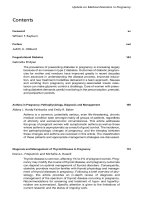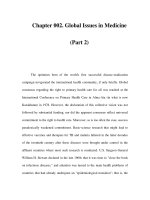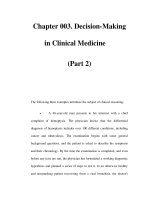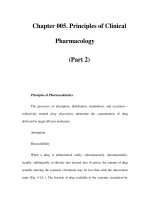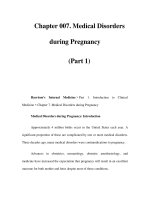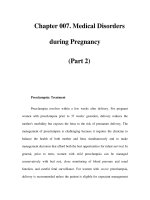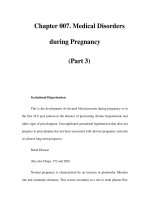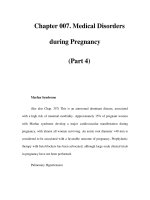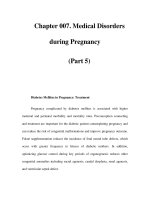Chapter 007. Medical Disorders during Pregnancy (Part 2) pdf
Bạn đang xem bản rút gọn của tài liệu. Xem và tải ngay bản đầy đủ của tài liệu tại đây (13.76 KB, 4 trang )
Chapter 007. Medical Disorders
during Pregnancy
(Part 2)
Preeclampsia: Treatment
Preeclampsia resolves within a few weeks after delivery. For pregnant
women with preeclampsia prior to 37 weeks' gestation, delivery reduces the
mother's morbidity but exposes the fetus to the risk of premature delivery. The
management of preeclampsia is challenging because it requires the clinician to
balance the health of both mother and fetus simultaneously and to make
management decisions that afford both the best opportunities for infant survival. In
general, prior to term, women with mild preeclampsia can be managed
conservatively with bed rest, close monitoring of blood pressure and renal
function, and careful fetal surveillance. For women with severe preeclampsia,
delivery is recommended unless the patient is eligible for expectant management
in a tertiary hospital setting. Expectant management of severe preeclampsia
remote from term affords some benefits for the fetus with significant risks for the
mother.
The definitive treatment of preeclampsia is delivery of the fetus and
placenta. For women with severe preeclampsia, aggressive management of blood
pressures > 160/110 mmHg reduces the risk of cerebrovascular accidents.
Intravenous labetalol or hydralazine are the drugs most commonly used to manage
preeclampsia. Intravenous hydralazine may be associated with more episodes of
maternal hypotension than labetalol. Alternative agents such as calcium channel
blockers may be used. Elevated arterial pressure should be reduced slowly to
avoid hypotension and a decrease in blood flow to the fetus. Angiotensin-
converting enzyme (ACE) inhibitors as well as angiotensin-receptor blockers
should be avoided in the second and third trimesters of pregnancy because of their
adverse effects on fetal development. Pregnant women treated with ACE inhibitors
often develop oligohydramnios, which may be caused by decreased fetal renal
function.
Magnesium sulfate is the treatment of choice for the prevention and
treatment of eclamptic seizures. Two large randomized clinical trials have
demonstrated the superiority of magnesium sulfate over phenytoin and diazepam,
and a recent large randomized clinical trial has demonstrated the efficacy of
magnesium sulfate in reducing the risk of seizure and possibly reducing the risk of
maternal death. Magnesium may prevent seizures by interacting with N-methyl-D-
aspartate (NMDA) receptors in the CNS. Given the difficulty of predicting
eclamptic seizures on the basis of disease severity, it is recommended that once the
decision to proceed with delivery is made, all patients carrying a diagnosis of
preeclampsia be treated with magnesium sulfate (see Regimens, below).
Regimens for the Administration of Magnesium Sulfate for Seizure
Prophylaxis in Women in Labor with Preeclampsia
Intramuscular Intravenous
6-g bolus over 15 min
10 g (5 g IM deep in
each buttock)
a
1–3 g/h by continuous infusion pump
5 g IM deep q4h,
alternating sides
May be mixed in 100 mL crystalloid; if given
by intravenous push, make up as 20
% solution; push
at maximum rate of 1 g/min
40-g MgSO
4
·7H
2
O in 1000 mL Ringers
lactate; run at 25–75 mL/h (1–3 g/h)
a
a
Made up as 50% solution
Chronic Essential Hypertension
Pregnancy complicated by chronic essential hypertension is associated with
intrauterine growth restriction and increased perinatal mortality. Pregnant women
with chronic hypertension are at increased risk for superimposed preeclampsia and
abruptio placenta. Women with chronic hypertension should have a thorough
prepregnancy evaluation, both to identify remediable causes of hypertension and
to ensure that the prescribed antihypertensive agents are not associated with an
adverse outcome of pregnancy (e.g., ACE inhibitors, angiotensin-receptor
blockers). -Methyldopa, labetalol, and nifedipine are the most commonly used
medications for the treatment of chronic hypertension in pregnancy. Baseline
evaluation of renal function is necessary to help differentiate the effects of chronic
hypertension versus superimposed preeclampsia should the hypertension worsen
during pregnancy. There are no convincing data that demonstrate that treatment of
mild chronic hypertension improves perinatal outcome.
